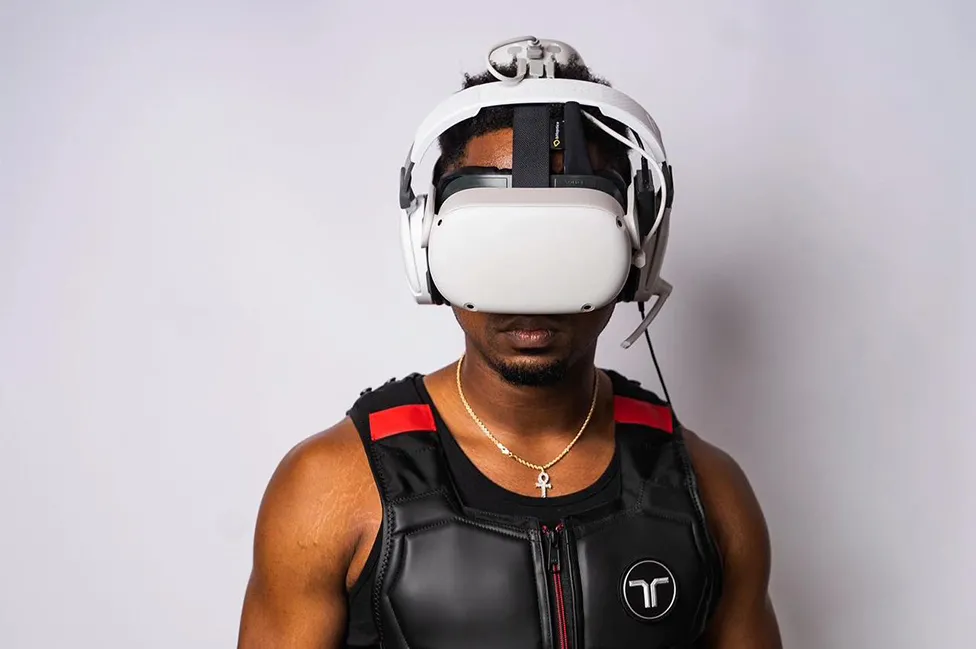Can VR influencers save the metaverse?
Is the metaverse dead? Some people think so, but others are still convinced virtual worlds are the future.

In 2021, the metaverse became the tech buzzword on everyone's lips and big companies, especially Facebook, threw money at it.
But despite the flashy demos the virtual reality (VR) dream hasn't quite taken off as some would have hoped.
And with AI programs like ChatGPT eating up recent headlines, some people think the metaverse has already had its moment.
But not everyone agrees, and more influencers are trying to carve a niche in the virtual world.
What is the metaverse?
There is disagreement over the exact definition of the term metaverse, which can make it confusing.
But most of the time it refers to some sort of virtual world where the user is represented by an avatar - a computerised version of themselves.
Inside these, people can interact with each other to socialise and play games.
Technology journalist Jay Peters, from website the Verge, says "some metaverses include elements where you can create your own content and build your own worlds".
This is why some people argue that popular games such as Minecraft, Roblox and Fortnite are examples of metaverses.
But the vision seen in glitzy tech showreels usually involves users putting on a VR headset to take part.
And rather than being an arena for deathmatches, the vision is for something more like a digital version of the real world.
Companies believe metaverses could one day replace going to the office and become the main way we socialise online.
'A magical experience'
TigressX, who's been creating gaming content for more than 15 years, says one of her favourite metaverse activities is watching films with friends.
"It almost feels like you are physically hanging out," she says.
And she's even seen vows exchanged.
"I actually attended a wedding in VR once for a friend who lives in America. It was interesting for sure. But really fun."
Influencer Techman Ju creates video content, plays VR games, and shares commentary on YouTube and TikTok.
He first delved into the metaverse "to go to places that you can't go to in the real world - different worlds, universes, galaxies, and dimensions.
"The first time you put [a headset] on it's actually a magical experience," Techman Ju says.
Thrill, another metaverse influencer who posts hardware reviews and industry commentary, says he was drawn in by the human connections VR can create.
"It's really special because it's a higher-level connection than meeting somebody through message or a game," he says.
"People can connect in different or better ways than they could otherwise."
Although virtual worlds can be used for escapism, Thrill sees them as a way to enhance everyday life and present yourself exactly how you want.
"It does things that you can't do in reality. It's a reality enhancer, not an escapism tool."
Enter the metaverse
Some experts think influencers like Techman Ju, TigressX and Thrill could be the key to boosting the metaverse's profile.
VR film director Alex Ruhl - head of metaverse technologies at PwC - says it's "more immersive, intimate and interactive than just posting videos or live streaming".
She says established influencers are already using the metaverse as a new way to engage their existing followers.
"I think we'll see more and more metaverse-first influencers pop up that then take that influence and disperse it across other channels as well," says Alex.
Tech journalist Jay thinks VR technology will need to become more popular - and companies must convince users to go there
"If people create their own metaverse spaces, virtual worlds and own communities, that's what's going to make people show up," he says.
Gaming hopes
One thing that could get people on board is video games.
Some of the most popular VR titles are games, and Playstation maker Sony recently released its newest headset.
Journalist Jay thinks gamers are a natural audience for the metaverse because they've "participated in virtual worlds for decades".
"They are familiar with how to interact online and build communities with people they only know online or as avatars."
Techman Ju believes gaming should be the "number-one priority" as it will "jumpstart getting more people into VR headsets".
But, at the moment, the cost of entry is one of the main barriers to entering the VR metaverse.
TigressX says equipment prices are her main concern but we are starting to see lower-cost headsets coming out.
Techman Ju and Thrill think VR content will become more popular as the hardware becomes more accessible.
And a report from the Pew Research Centre, in the USA, says the metaverse could have up to half a billion users by 2040.
That's a long way off, but Thrill says it's an exciting time now as "you can be any type of influencer you could possibly imagine".
"This is opening up a whole new realm of things you can do."
-bbc






